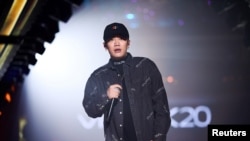China’s censors have a new target in a widespread campaign on popular culture: hip-hop.
The popular competition television show “Rap of China” helped spread interest in the music among Chinese young people. Hip hop artists Wang Hao, known as “PG One” and Zhou Yan, known as “GAI” are the two winners of the show.
The government has acted against them in recent weeks for bad behavior or producing material not in agreement with Communist Party values. GAI was removed from the hit show “The Singer” last week.
Hip-hop still is a new music in China. The campaign against it demonstrates a broader restrictiveness on popular culture. Chinese leadership is looking for ways to control possible openings for youthful dissent.
Beijing is willing to use popular culture to shape public opinion. Last year, before it opened the five-yearly Communist Party National Congress, officials connected with new rap artists. Officials agreed to support their work on the condition that it demonstrate party values.
PG One recently was forced to apologize for lyrics, which critics said were insulting to women and called for the use of recreational drugs.
The official Xinhua news agency wrote that PG One “does not deserve the stage,” and that “we should say ‘no’ to whoever” provides a platform for such messages. Other official media and companies quickly removed the rapper’s music from most online sites.
Chinese officials are taking similar action against a wide expanse of pop culture, from video games to performance art.
PG One, Vava and Hunan TV could not immediately be reached for comment. GAI, who tried to make his act more acceptable to the Communist Party did not answer requests for comment.
The Chinese internet company Sina reported Friday that the government had said immoral and vulgar material, including hip-hop - and even images of tattoos, should not be broadcast.
The State Administration of Press, Publication, Radio, Film and Television did not answer a request for comment Monday.
Other campaigns against pop artists
This is not the first time Chinese musicians have experienced official interference. In 2015, China’s culture ministry banned 120 songs - mostly rap - for “promoting obscenity, violence, crime or threatening public morality.”
In July last year, Beijing’s Municipal Bureau of Culture barred Justin Bieber from performing in China. It said it acted because past performances there had created “public dissatisfaction.”
A month later, organizers seeking to bring Grammy Award-winning artists to China said they would only accept artists with a "positive and healthy image.”
Li Yijie is a rapper with government-supported band Tianfu Shibian. He said that censors were not rejecting all hip-hop but that some businesses, TV stations and people “had lost confidence in hip-hop.”
“Maybe local television stations think it is too sensitive to run hip-hop shows now,” he said.
I'm Caty Weaver.
Caty Weaver adapted this story for Learning English based on Reuters news reports. Hai Do was the editor.
Write to us in the Comments Section or on our Facebook page.
_______________________________________________________________
Words in This Story
censor - n. a person who examines books, movies, letters, etc., and removes things that are considered to be offensive, immoral, harmful to society, etc.
recreational - adj. of a drug: used for pleasure instead of for medical purposes
deserve - v. used to say that someone or something should or should not have or be given something
stage - n. a place or area of activity in which the things that happen are watched with great interest by many people
platform - n. something that allows someone to tell a large number of people about an idea, product, etc.
vulgar - adj. not having or showing good manners, good taste, or politeness
promote - v. to help (something) happen, develop, or increase
obscenity - n. offensive language and/or behavior
confidence - n. a feeling or belief that you can do something well or succeed at something





